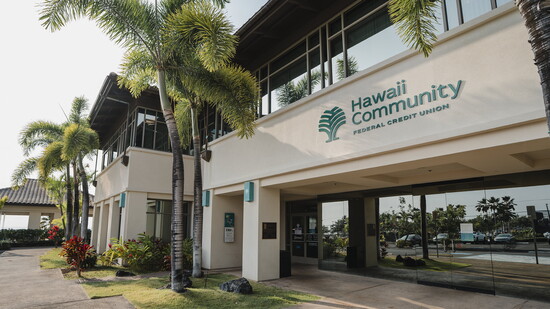In the ever-evolving world of finance and investing, sometimes things really do come full circle. That has been the revelation for Tricia Buskirk, President and CEO of Hawaii Community Federal Credit Union, through several decades in financial services.
“I was student credit union secretary when I was in high school,” Tricia says during a recent conversation at Hawaii Community Federal Credit Union’s Kaloko branch. “Back then, it was a little different. We had a little cash can, and the very friendly ladies from the credit union would come every day to pick up the cash can and take it to the credit union for the deposits.”
The credit union was the first one in Hawai'i to sponsor student credit unions. And those ladies were an early inspiration for how a credit union could positively affect its community.
Today, the focus on the community is paramount for Hawaii Community Federal Credit Union. The credit union manages Youth Deposit Days at schools around Hawai'i Island, providing many keiki their first opportunity to develop financial awareness.
“Sometimes the youth don’t have that foundation of learning how to save and budget,” says Nellie Medeiros, Corporate Development & Marketing Manager at Hawaii Community Federal Credit Union.
Keiki who participate in the Youth Deposit Days are naturally encouraged to be responsible with their finances. After all, they must not only save any money they collect but also put in the effort to bring their cash and coins to school and make their deposits.
Many of the keiki take it to the next level. Some recycle to collect cash. Others save coins from around the house for deposit day. One girl was so excited about the opportunity to stock away cash in her savings account that she began raising chickens and selling organic eggs, putting her earnings into her account on deposit days.
“She even had a business card,” Tricia laughs.
The youth accounts come with lower minimums — only $5 — than typical personal accounts.
“We wanted to make it affordable,” Nellie says.
The program also pays dividends for adults in the house who may not have developed good financial habits yet.
“Once the keiki learn, they go back home and say, ‘Today is deposit day at the credit union!’” Nellie says.
Hawaii Community Federal Credit Union’s roots run deep in the county. It was initially founded as the Kona Farmer's Federal Credit Union in 1936 by ten struggling coffee farmers who were denied loans and other financial services during the Great Depression. Starting the credit union in a single room, the farmers wanted to take out loans before the growing season and pay them back after harvesting and selling their crops.
It opened to the general public in 1939 as the Kona Community Federal Credit Union. In 1982, the credit union merged with Kohala Federal Credit Union. Then, in 1991, the credit union became Hawaii Community Federal Credit Union. The focus has always been on the community.
“As Nellie likes to say, ‘community’ is our middle name,” Tricia says.
The credit union sponsors financial literacy programs and events at local schools. Their financial reality fairs are particularly popular with high school seniors about to assume more responsibility for their finances. The credit union provides a number of scholarships to high school seniors and students already in college. And it partners with the organization Banzai to provide free online finance courses for school teachers looking to expand their students’ financial literacy.
“Normally, you have a CEO who will say, ‘What’s the ROI on this?’” Tricia says. “The investment is in the children. That's our future. And the more knowledge that they get, you have a much healthier community with people more educated about their finances.”
For adults who need to jumpstart their savings, the credit union offers “budget” certificates that require a lower initial deposit than most certificates of deposit while still offering greater rates of return. The credit union partners with several organizations to help local individuals and families interested in purchasing homes or getting started with other types of investing.
For those unfamiliar with the difference between traditional banks and credit unions, the latter are not for profit — even the board of directors is composed of volunteers. Rather, credit unions invest what would otherwise be profits in providing better rates and services and acting as stewards of their communities.
“The credit union has weathered all the changes,” Nellie says. “We haven’t changed who we are.”
Credit unions themselves form a community, working together across regions and state lines to empower their members financially.
“We all have the same vision,” Tricia says. “People before profits. People helping people.”
HICommFCU.com.
Once the keiki learn, they go back home and say, ‘Today is deposit day at the credit union!'
The investment is in the children. That's our future. And the more knowledge that they get, you have a much healthier community with people more educated about their finances.
